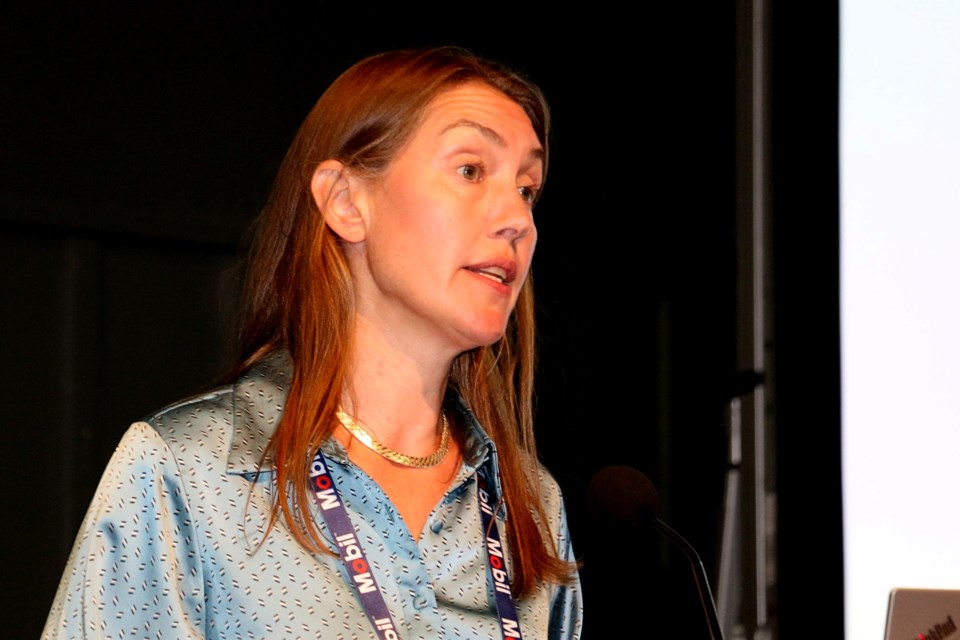Nickel mining executive Johnna Muinonen told mining leaders in Sudbury Monday that Canada has fallen behind in nickel production compared with other countries in the world and she said there are some concerns in the Canadian nickel mining industry that need to be addressed before other countries in the take advantage of the growing demand for the metal.
Muinonen is president of Dumont Nickel, Magneto Investments LP. Along with being a professional engineer (P.Eng) Muinonen has spent more than 20 years as a mining executive and in operational management in nickel mining, including nine years with Vale.
She was a keynote speaker at the Mine Operators and Maintenance Engineers conference, hosted by the Sudbury branch of CIM (Canadian Institute of Mining, Metallurgy and Petroleum).
Most of her address was focused on the growing importance of nickel and other critical minerals for the manufacture and supply of batteries for battery electric vehicles (BEVs) for the automotive market as well as electric vehicles for industry.
Muinonen said that needs to change if North America wants to win back a significant share of the market.
Muinonen told the crowd that Indonesia today produces more than 30 per cent of the world supply of nickel. More importantly, she said, is that the processing of nickel is dominated by China. She said that means the battery supply chain is dominated by China.
"So the average in Ontario for electric vehicle registrations is about 5.7 per cent — globally, it's five per cent. But in Sudbury, we're actually closer to 10 (per cent). And I know I've personally driven EVs now for four years, and I know when I drive around Sudbury, I used to never see one. And now I see one almost every day, one of them out there," Muinonen said.
Muinonen also presented several charts of graphs from the International Energy Agency, outlining the demand and production of nickel around the world. Muinonen said it was worth noting in the various charts that Canada was not mentioned, but was merely lumped in with others in the world.
She said the pressure is on to create more mines and more refineries in Canada by 2030.
"You know the estimate is that we need 40 to 60 new nickel mines by that time. And above that, and just in terms of scale, each one of those different mines needs to produce an average of 30,000 tonnes of nickel annually.
“To put that in perspective, we need 40 to 60 nickel mines that are half of the Sudbury smelter (output) by 2030. And that number is just huge. To be honest, I don't know if it's even feasible. But I do think that as part of that, Canada has a role to play."
She said one of the good things that has happened recently is a newly passed law (August 2022) in the United States — the U.S. Inflation Reduction Act — which is expected to provide billions of dollars in tax incentives for clean energy, which includes incentive for electric vehicles. This will impact vehicles made in the United States as well as by any U.S. free trade partners, which means Canada. It also means that battery-critical minerals sourced from Canada, such as nickel and nickel sulphate, qualify for the incentive program for US vehicles, Muinonen said.
She said Canada has the resources to catch up but it will take some cooperation within the mining industry.
"We do have nickel sources in Canada that we can exploit. We can work within supply chain development," she said.
"I don't think we're going to see these deposits get developed by just a mining company coming in and building it. I think it's going to be relationships up down the supply chain, with each of the people taking a bit of sharing a bit of the risk," Muinonen added.
She added she has a concern that too many mining operators are afraid of risk.
"We've become so risk averse. We try to manage all these risks by doing studies and doing more and more, gather more information. I'm not sure at the end of the day, it actually reduces our risk at all. It really does mean, we don't have another mine in production 10 years from now."
Muinonen said the notion of managing risk has become the No. 1 limitation on mining in this country, resulting in valid projects being shelved or not getting developed in a timely manner.
"I do think that in general mining companies are incredibly adverse to risk. We're in a risky business. And I think that we study and study and study, and then shelf, and then study and study and shelf. And you know, like I said, these projects have been around for a really long time.
She said slow progress in Canada is not just mining companies, but also in the auto sector.
Muinonen also commented on the research and development around battery chemistry and development of better automotive batteries. Her prediction is that change "is a long way out" because auto manufacturers are already producing BEVs. She said as automotive infrastructure gets established, the resistance to change will be higher.
"It's really hard to change when you're making a car that you make lots of money on. And you now have to retool your entire plant to make it up, or you have to go with a new plan. So I do think that's going to be slow," she said.
Len Gillis covers mining and health care for Sudbury.com.



